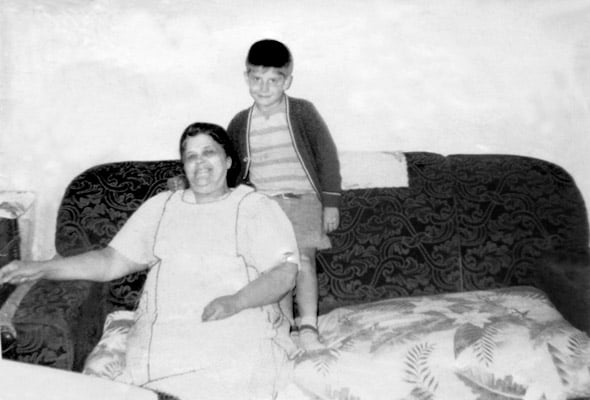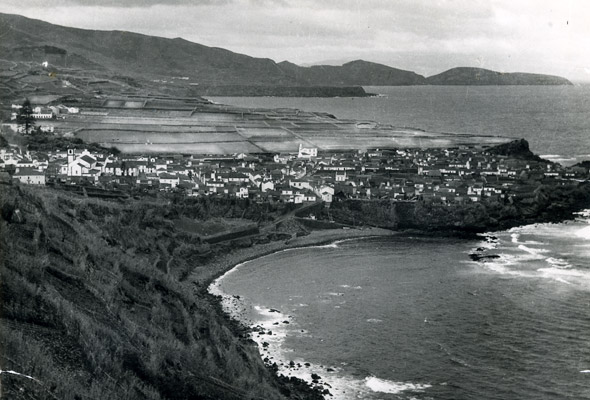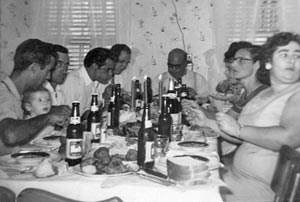

Clearly, something had to be done. So I approached my mother and aunts with a sheepish grin on my face and a video camera in my hand. My goal: to film family favorites being prepared before they too were lost. I wanted a permanent record of the food that filled three tables every Sunday when we laughed and talked (which to other families sounded like fighting), and my mother and aunts buzzed about happily shoveling their specialties onto our plates.

While they were eager to squeeze their way into the viewfinder, capturing their culinary heirlooms proved daunting. For example, there must have been a shortage of measuring cups and spoons in the Azores, because my mother and aunts cook only with pinches of this and handfuls of that. I had to yell “CUT!” more times than I care to recall to fish out a mound of parsley from boiling broth or catch a fistful of garlic midair in order to measure it properly.
Vocabulary proved another sticking point. While the National Live Stock and Meat Board categorizes beef into no fewer than 45 different cuts, it’s all just “meat” to my mother. Any further questioning was met with a shrug of her shoulders and — as if I were asking about sex — the admonition to discuss it with my father. In her intuitive, cookbook-free world, there were no fancy names or elaborate techniques. You simply rolled up your sleeves and began chopping.
But over time the recipes, as well as forgotten bits of family history, revealed themselves. I remembered summer days spent shucking fava beans with VoVo in her kitchen. And even though she sat there in just her slip plonking beans into a big white washtub at her feet, she looked like an empress. I joked with my mother about the ridiculous amount of food she makes every October for family and friends who help my father harvest his grapes for wine. Believe it or not, I even developed an appreciation, but certainly not a taste, for my Aunt Irene’s octopus stew.

I came to accept that our food defines us, whether we’re sitting at the kitchen table or not. Simply put, we are a family of immigrants — something I denied as a teenager by idolizing Big Macs and the Colonel’s original recipe. Anything to deep-six the Portuguese part of my Portuguese-American heritage.
Well, not any longer. My first visit to the Azores is scheduled for next fall. To prepare, I’m learning Portuguese, much to the hilarity of everyone. But most important, whenever I crave a taste of home, I just pop a cassette into the VCR and follow along with my mother and aunts — to me, the best collection of chefs on TV.












I just came across your site and am thoroughly enjoying it all, especially the tidbits on your Portuguese heritage. I was born in Terceira and came to California when I was four. I was lucky enough that my parents settled into a small Portuguese hamlet, and I’ve been able to raise my children in our culture. The picture of your family around the table really spoke to me. I smiled seeing the men on one side and the women on the other, so typical. The dinner table is the center of every Portuguese home ,and a Portuguese mother is at her happiest when feeding her family. The food might be simple but always delicious and abundant, while the laughter and opinions are never in short supply. And yes, we can be loud, but the way I see it, the louder the voices the greater the love. Thanks for sharing.
My pleasure, Guida. And you hit the nail on the head: The louder the voices the greater the love. And believe it or not, I’ve never noticed that the women were on one side and the men were on the other. Isn’t that odd–my not noticing, I mean.
Dear David,
Its October 2012, and I just find your article describing your Portuguese-Azorean-American culinary roots. I laughed out loud at the many common traits I share with you as a Portuguese-Azorean-Canadian descendent now living in Italy for the last 17 years. What a delight, the wonderful memories that came to mind and the “saudade” that you brought back to me. Thank you for what you are doing. My roots are from Velas in São Jorge Island, and I was surprised when you mentioned that certain spices where not much used in the Azores. My “avozinha” (Grandmother) and my mother are big on cinnamon. One only needs to think of the S. Jorge desert specialty “espécies,” which is a delicious spicy, doughy filling baked inside a pie crust dough casing in the form of a doughnut or horseshoe “biscuit,” or the well known sweet rice pudding with cinnamon over top. I realize that in the Azores each town is an exception to itself…that is what makes them so fascinating and wonderful. Last July, I was at the parish feast in Maia and enjoyed the welcoming warmth of its people. Thank you for keeping alive the wonderful traditions of this undiscovered paradise. jose a bettencourt
Jose, well, as they say: Better late than never!
It is amazing that no matter how different we are, we do shared a special bound by being of Azorean heritage. As you say, each island, town, and family cooks differently. For example, my family does use a lot of herbs and spices, cinnamon, paprika, and bay leaf being the most popular. But we don’t use allspice at all, which is so common on Terceira and in the dish alcatra.
Come back often, Jose!
Dear José Bettencourt and David
The Azorean gastronomy still reflects three distinct cycles: the cycle before the discovery of African and oriental spices (like “sopas do Império, in Santa Maria, where the meat is cooked only with salt, and after it’s added to the broth with mint and dill – the best meat all over the World, I think…); the cycle of the pepper of African origin, which predominates in São Miguel (until the passing of the first half of twentieth-century, many workers endured whole days only fed on maize bread (broa) and salted peppers, which easily gives the sensation of satiation); and the spices that came from the West, which were more generalized in the islands of the Central Group, probably due to their proximity to the Purveyor’s Office of the Fleets, in the city of Angra (like the famous “alcatra” of Terceira, with different methods of cooking).
Abraços,
Daniel
Prezado colega Daniel,
Thank you for such a fascinating looking into Azorean food. Tell me, are you a food historian?
Dear David
I am only a writer. But since my childhood I like to know the more I can. A Spanish editor asked me a book about the Azores, and I tried to do it the best way I could. After this, my editor asked me too some books about the islands (Santa Maria, São Miguel and Terceira). Once more, I tried to do my best.
Here I offer you a true scene of the Impérios (Holy Spirit Feast) of Santa Maria, from my book “Santa Maria, Island Mother.”
“However, the pantry had a dark, even gloomy look. All the tables were filled up from early morning to late night, sometimes with hungry people, others were just passing by and were picked up by the grabbers, the last on the hierarchy of the “Empire .” Their function was to ascertain that no seat was left vacant on the table, at any given time, even if they had to use force. But alas, miracle oh miracle, there was always enough room on one’s tummy for a good cut of meat, or two, on top of hard slices of bread, soaked by that generous broth, that soon oiled our lips. The table helpers never stopped, making sure everything was in place. They brought in more soups, broth and meat; they walked around the tables filling up the communal cup from where everyone drank. You know how quickly it became greasy! You could see those oily marks from afar. For sure, the Holy Spirit who was being eulogised together with the ‘Emperor’ certainly took care of our health and threw away any misgivings people might have.”
Abraços,
Daniel
Daniel, thank you for sharing that. It’s lovely. And never, ever say you’re just a writer. It’s a noble profession.
David – I stumbled onto your Leite’s Culinaria while looking for a recipe for pão de lo. I am in love! Your experience as a Portuguese-American child is so similar to my experience–we could be siblings! I have spent several hours this morning looking at all your recipes and reminiscing about all the sounds, smells, and interactions I grew up with! I am going to the bookstore TODAY to get your book! Thanks for documenting your family history. Just like you, my avó, tias, and mom never used a cookbook, and I never paid attention until it was too late and much of the history was lost. I feel like I just reconnected via your documenting of traditional Portuguese Cuisine! Thanks for bringing me back to all the great memories of my childhood!
D.O., what a lovely comment to wake up to, thank you. I hope you find many recipes–Portuguese and not–to try here. And thank you for buying the book. If you need anything or have any questions, please don’t hesitate to drop me a line.